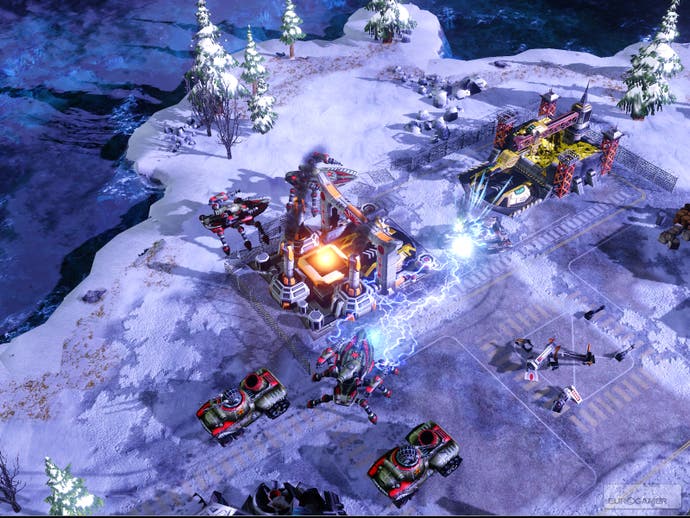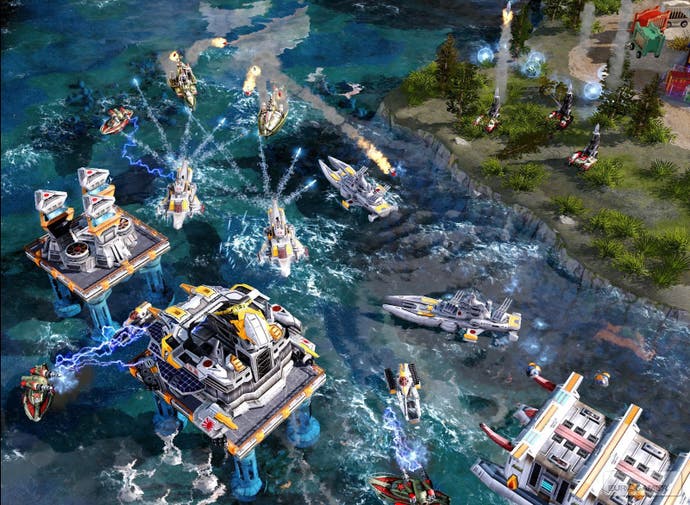Command & Conquer: Red Alert 3
Faction stations.
True to decades of anime clichés, Rising Sun also has transformable vehicles, such as the Tengu, which looks to be the faction's workhorse, that starts as a mecha, but is able to transform into a jet. On foot, it's ideal for ground-to-ground infantry harassment, whereas in the skies it has more powerful weapons at its disposal, but is limited to targeting only other air units. All the transforming units come equipped with brilliantly nerdy transition animations - the Tengu does a smart little back-flip and sprouts wings as it heads for the clouds - and all have the same trade-off between strengths and weaknesses that lies at the heart of every RTS.
And, visually, Rising Sun are a highlight. "Our dirty little secret is it's the art team's opportunity to pay homage to a lot of Japanese culture and anime and manga and those games we grew up playing," laughs producer Amer Ajami, and the units we saw invoked everything from Gundam to Bubblegum Crisis to Treasure's Ikaruga. Given the light-hearted approach of the rest of the game, these eclectic styles fit into the existing art design with little fuss; more problematic has been making sure that the adaptability offered by the transformable units doesn't provide quick-fingered Rising Sun players with too much of an advantage. "Originally we had it so that you could switch back and forth between the different unit modes as fast as you could press the button," sighs Ajami. "But we found that advanced players were just murdering everybody. In the end we just introduced a cool-down period after transforming, and that pretty much solved the problem."
While the Rising Sun have the monopoly on transformers, secondary functions are a core component of almost all of the game's units, due, mainly to the new focus on water. Red Alert hasn't enlisted in the navy for good, but it's certainly found its sea legs, and the huge oceans on most maps require vehicles which work on both earth and water, and can switch terrain types seamlessly. You can even take your MCV out onto the open sea and construct buildings there, but once again, a power trade-off means the situation requires a lot of tactical forethought if you want to defend yourself. "You have to think a lot more about where you are in order to get the best out of your units," explains Ajami, showing how a Riptide APC sacrifices its torpedoes and has to make do with just a machine gun as it crawls onto land. "If you're strong on land, your enemy can simply build at base at sea, and then you're in trouble."

Other adjustments include changes to resource-gathering. "In the previous games, ore was scattered all around the map, and that allowed players to place an arbitrary amount of harvesters around the landscape and ramp up the money too quickly," says Ajami. "You got a lot of inflation, allowing people to build a lot of units early on and just throwing them at other people. We wanted to gate that with Red Alert 3." This time around, ore is located in specific node points, which release a set amount of resource regardless of how many refineries and harvesters are built nearby - you can add more mining structures to a node if you want to, but you won't be getting the ore out any quicker.
And finally, for the first time, the entire single-player campaign has been designed with online co-op in mind, with a permanent second character that's AI-controlled when you're playing on your own. It's a welcome addition to regular multiplayer, but you'll need to play with people you can rely on, as the AI can't leap back in at a moment's notice, and a player dropping-out mid-level means you'll have to restart the map.

From what we've seen, Red Alert 3 seems likely to make the transition to 360 with some poise, but this remains a PC game at heart. Camp and throwaway as the narrative and presentation is, deep down, it's still a world of build queues and multi-front fighting that may intimidate many new players. Existing fans can probably rejoice, however, as, new faction and gameplay tweaks aside, this looks like the Red Alert you've been waiting for. Within seconds of sitting down at the demo, we were building, exploring, and causing the same old havoc in the new levels as we had in the old.
Familiarity like this can't be faked; sometimes, not even the presence of hotpants can change that.
